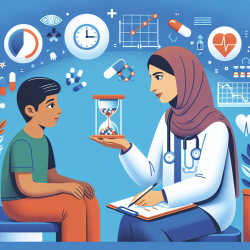Introduction
In the field of speech-language pathology, ensuring the best outcomes for children is paramount. As practitioners, we must be vigilant about the factors that influence therapy success, including the responsible use of antibiotics. The research article titled Towards a global definition of responsible antibiotic use: results of an international multidisciplinary consensus procedure provides a comprehensive framework that can be adapted to our practice to enhance outcomes.
Understanding Responsible Antibiotic Use
The study highlights the importance of defining responsible antibiotic use through a global consensus. It identifies 22 key elements, categorized into patient-level and societal-level elements, that should guide antibiotic use. For speech-language pathologists, understanding these elements can help in making informed decisions that impact therapy outcomes.
Key Elements of Responsible Antibiotic Use
- Microbiological Diagnostics: Utilizing diagnostic tools to ensure antibiotics are used only when necessary.
- Indication: Restricting antibiotic use to cases where it provides proven benefits.
- Antibacterial Activity and Spectrum: Selecting antibiotics based on their activity and spectrum to minimize resistance.
- Duration and Dosing: Using the shortest effective duration and appropriate dosing to reduce resistance risks.
- Education: Ensuring ongoing education for healthcare professionals and the public about responsible antibiotic use.
Implementing the Research in Practice
For speech-language pathologists, integrating these elements into practice involves collaboration with medical professionals and staying informed about the latest research. Here are some steps to consider:
- Collaborate with Medical Teams: Work closely with pediatricians and other healthcare providers to ensure antibiotics are prescribed responsibly.
- Stay Educated: Participate in continuing education opportunities focused on antibiotic stewardship and its impact on therapy outcomes.
- Advocate for Responsible Use: Educate families and caregivers about the importance of responsible antibiotic use and its role in effective therapy.
Encouraging Further Research
The study provides a foundation for further research into how responsible antibiotic use can specifically impact speech-language therapy outcomes. Practitioners are encouraged to explore this area, contributing to the body of knowledge and improving practices.
Conclusion
By implementing the principles of responsible antibiotic use, speech-language pathologists can enhance therapy outcomes for children. This approach not only aligns with global health priorities but also supports data-driven decisions that lead to better health outcomes.
To read the original research paper, please follow this link: Towards a global definition of responsible antibiotic use: results of an international multidisciplinary consensus procedure.










